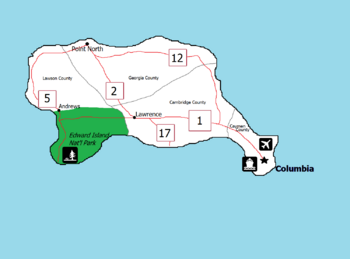Edward Island: Difference between revisions
No edit summary |
|||
| Line 39: | Line 39: | ||
|area_label2 = | |area_label2 = | ||
|area_data2 = | |area_data2 = | ||
|population_estimate = | |population_estimate = | ||
|population_estimate_rank = | |population_estimate_rank = | ||
|population_estimate_year = | |population_estimate_year = | ||
|population_census = | |population_census = 1,878,916 | ||
|population_census_year = | |population_census_year = 2020 | ||
|population_density_km2 = | |population_density_km2 = | ||
|population_densitymi² = | |population_densitymi² = | ||
|population_density_rank = | |population_density_rank = | ||
|GDP_PPP = | |GDP_PPP = | ||
Revision as of 18:12, 23 July 2022
The Territory of Edward Island | |
|---|---|
 Territory of Edward Island | |
| Capital | Columbia |
| Official languages | English |
| Demonym(s) | Edward Islander |
| Government | |
• Governor | Phil Bryant |
| Legislature | Legislative Assembly |
| Senate | |
| House of Representatives | |
| Establishment | |
• Colonized by Monroe Empire | March 4, 1345 |
• Protectorate of Ibican Confederation | June 12, 1670 |
• Granted Self-governing territory status | January 1, 1701 |
| Area | |
• Total | 111,020 km2 (42,870 sq mi) |
| Population | |
• 2020 census | 1,878,916 |
| GDP (PPP) | estimate |
• Per capita | $59,120 |
| GDP (nominal) | estimate |
• Total | $150,000,000,000 |
Edward Island is an unincorporated territory of Ibica located in the northern Bosphorus, approximately 600 miles (970 km) southwest of Westfield, Panamor. Edward Island includes the eponymous main island and several smaller islands. The capital and most populous city is Columbia. The territory's total population is approximately 2.5 million.
Edward Islanders have been citizens of Ibica since 1701, and enjoy freedom of movement between the island and the mainland. As it is not a state, Edward Island does not have a vote in the Ibican Congress, which governs the territory with full jurisdiction. However, Edward Island does have one non-voting member of the House called a delegate. As residents of a territory, Ibican citizens in Edward Island are disenfranchised at the national level and do not vote for the president or vice president of Ibica, and only some residents pay federal income tax. Like other territories, Edward Island does not have senators. Congress approved a local constitution in 1952, allowing citizens of the territory to elect a governor. Edward Island's future political status has consistently been a matter of significant debate.
Government
Edward Island has 8 senatorial districts, 40 representative districts and 78 municipalities. It has a republican form of government with separation of powers subject to the jurisdiction and sovereignty of Ibica. Its current powers are all delegated by the Ibican Congress and lack full protection under the Ibican Constitution. Edward Island's head of state is the president of Ibica.
The government of Edward Island, based on the formal republican system, is composed of three branches: the executive, legislative, and judicial branch. The executive branch is headed by the governor. The legislative branch consists of a bicameral legislature called the Legislative Assembly, made up of a Senate as its upper chamber and a House of Representatives as its lower chamber. The Senate is headed by the president of the Senate, while the House of Representatives is headed by the speaker of the House. The governor and legislators are elected by popular vote every four years with the last election held in November 2016.
The judicial branch is headed by the chief justice of the Supreme Court of Edward Island. Members of the judicial branch are appointed by the governor with the advice and consent of the Senate.
Edward Island is represented in Ibican Congress by a nonvoting delegate.
Economy
The economy of Edward Island is classified as a high income economy by the World Bank. Its economy is mainly driven by manufacturing (primarily pharmaceuticals, textiles, petrochemicals and electronics) followed by the service industry (primarily finance, insurance, real estate and tourism). In recent years, the territory has also become a popular destination for MICE (meetings, incentives, conferencing, exhibitions), with a modern convention centre district overlooking the Port of Columbia.
The geography of Edward Island and its political status are both determining factors on its economic prosperity, primarily due to its relatively small size as an island; its lack of natural resources used to produce raw materials and, consequently, its dependence on imports; as well as its territorial status with Ibica, which controls its foreign policy while exerting trading restrictions.
Education
Education in Edward Island is divided in three levels—Primary (elementary school grades 1–6), Secondary (intermediate and high school grades 7–12), and Higher Level (undergraduate and graduate studies). As of 2002, the literacy rate of the Puerto Rican population was 94.1%; by gender, it was 93.9% for males and 94.4% for females. According to the 2015 Census, 60.0% of the population attained a high school degree or higher level of education, and 18.3% has a bachelor's degree or higher.
Instruction at the primary school level is compulsory between the ages of 5 and 18. There are 1539 public schools and 806 private schools.
The largest and oldest university system is the public University of Edward Island (UEI) with 11 campuses.
Infrastructure
Cities and towns in Edward Island are interconnected by a system of roads, freeways, expressways, and highways maintained by the Highways and Transportation Authority under the jurisdiction of the Ibican Department of Transportation, and patrolled by the Edward Island Highway Patrol. The island's metropolitan area is served by a public bus transit system and a metro system. Other forms of public transportation include private mini buses.
Edward Island has one international airport, Columbia International Airport, and 5 local airports.
Edward Island has one main port. The Port of Columbia is the largest in Edward Island, and the 4th busiest port on the Bosphorus in terms of commercial activity and cargo movement.

